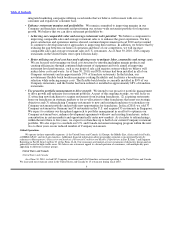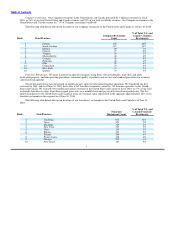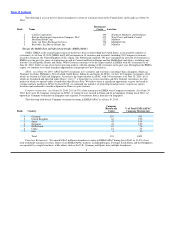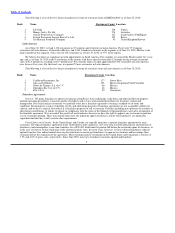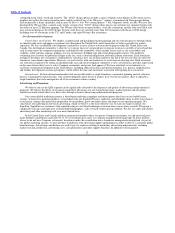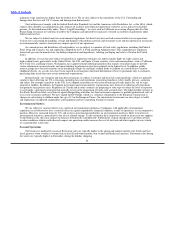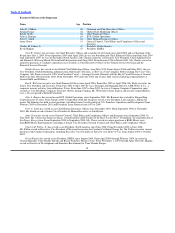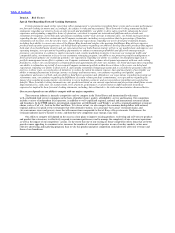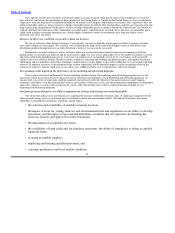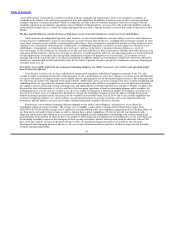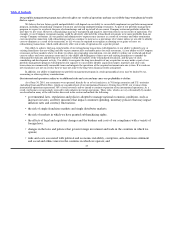Burger King 2010 Annual Report Download - page 18
Download and view the complete annual report
Please find page 18 of the 2010 Burger King annual report below. You can navigate through the pages in the report by either clicking on the pages listed below, or by using the keyword search tool below to find specific information within the annual report.
Table of Contents
minimum wage requirements higher than the federal level. We are also subject to the regulations of the U.S. Citizenship and
Immigration Services and U.S. Customs and Immigration Enforcement.
Our facilities must comply with the federal Fair Labor Standards Act and the Americans with Disabilities Act, or the ADA, which
requires that all public accommodations and commercial facilities meet federal requirements related to access and use by disabled
persons. As described more fully under “Item 3. Legal Proceedings,” we were sued in California in an action alleging that all of the
Burger King restaurants in California leased by the Company and operated by franchisees violated accessibility requirements under
federal and state law.
We are subject to federal and state environmental regulations, but these laws have not had a material effect on our operations.
Various laws concerning the handling, storage and disposal of hazardous materials and restaurant waste and the operation of restaurants
in environmentally sensitive locations may impact aspects of our operations.
As a manufacturer and distributor of food products, we are subject to a number of food safety regulations, including the Federal
Food, Drug and Cosmetic Act and regulations adopted by the U.S. Food and Drug Administration. This comprehensive regulatory
framework governs the manufacture (including composition and ingredients), labeling, packaging and safety of food in the United
States.
In addition, we may become subject to legislation or regulation seeking to tax and/or regulate high−fat, high−calorie and
high−sodium foods, particularly in the United States, the U.K. and Spain. Certain counties, states and municipalities, such as California,
New York City, and King County, Washington, have approved menu labeling legislation that requires restaurant chains to provide
caloric information on menu boards, and menu labeling legislation has also been adopted on the federal level. In addition, public
interest groups have focused attention on the marketing of high−fat and high−sodium foods to children in a stated effort to combat
childhood obesity. As a result, laws have been enacted in certain places that limit distribution of free toy premiums only to customers
purchasing kids meals that meet certain nutritional requirements.
Internationally, our Company and franchise restaurants are subject to national and local laws and regulations, which are generally
similar to those affecting our U.S. restaurants, including laws and regulations concerning franchises, labor, health, privacy, sanitation
and safety. For example, regulators in the U.K. have adopted restrictions on television advertising of foods high in fat, salt or sugar
targeted at children. In addition, the Spanish government and certain industry organizations have focused on reducing advertisements
that promote large portion sizes. Regulators in Canada and in other countries are proposing to take steps to reduce the level of exposure
to acrylamide, a potential carcinogen that naturally occurs in the preparation of foods such as french fries. The federal public attorney in
Sao Paulo, Brazil has filed a civil lawsuit against Burger King and other fast food restaurant companies to prohibit promotional sales of
toys in our restaurants in Brazil. We have signed the EU Pledge, which is a voluntary commitment to the European Commission to
change our advertising to children under the age of 12 in the European Union. Our international restaurants are also subject to tariffs
and regulations on imported commodities and equipment and laws regulating foreign investment.
Environmental Matters
We are subject to various federal, state, and local environmental regulations. Compliance with applicable environmental
regulations is not believed to have a material effect on capital expenditures, financial condition, results of operations, or our competitive
position. However, increased focus by U.S. and overseas governmental authorities on environmental matters is likely to lead to new
governmental initiatives, particularly in the area of climate change. To the extent that these initiatives caused an increase in our supplies
or distribution costs, they may impact our business both directly and indirectly. Furthermore, climate change may exacerbate adverse
weather conditions which could adversely impact our operations and/or increase the cost of our food and other supplies in ways which
we cannot predict at this time.
Seasonal Operations
Our business is moderately seasonal. Restaurant sales are typically higher in the spring and summer months (our fourth and first
fiscal quarters) when weather is warmer than in the fall and winter months (our second and third fiscal quarters). Restaurant sales during
the winter are typically highest in December, during the holiday shopping
16


